I. AMERICA ON THE BRINK: THE TWILIGHT OF DEMOCRACY
On the day before a nation falls into authoritarianism there won’t be a parade to mark the occasion. There won’t be some grand pronouncement made by the dictator standing on a balcony that announces the end of the democracy. There’s no single moment that signals the collapse of a democracy.
Instead, democracy decays in the background noise of our daily lives — a court decision too obscure for the average person to notice, FBI or DOJ orders that go unquestioned, policies that seem like minor adjustments until they become the new normal. Until, one day, the people wake up and realize they are no longer free and they no longer live in a democracy.
And no, this is not a warning about the distant future. This is where America stands now.
The Supreme Court, though at times capricious, was once the last line of defense against political overreach but has become something else entirely. It is a machine carefully constructed to validate and solidify power. Civil rights, elections, and executive limitations are no longer safeguarded; they are prey, vulnerable to the ink of a well-placed ruling. The Department of Justice and the FBI, once flawed but independent, are being reshaped in a different image—one where loyalty to a political figure is more important than loyalty to the Constitution.
Elections, the mechanism by which the people are “supposed” to decide their fate, have been manipulated by one of the political parties so that they are no longer about choice but have become a question of where you live and who is in control. So, while we may still have elections, they are more and more hollow performances where the ending is written long before the first ballot is cast.
And then there is the press. The journalists, the truth seekers. They won’t silenced with sweeping laws or violent crackdowns — well, at least not yet. Instead, they will be suffocated in a different way. They will lose access. They will be shut out. They will be accused of bias, of being enemies of the state (sound familiar?), until some of the public begins to believe it. And, as for those in the press who hope to hold onto their jobs and/or companies? They will learn to censor themselves before anyone else has to, not solely out of cowardice but also out of a desire to survive.
Yet the most dangerous threat is not the courts. Not the police. Not even the slow death of an independent press. As pernicious as the court’s surrender of its duty to blind justice, the surrender of law enforcement to the authoritarian and the slow death of the press; these are not the most significant threats.
The greatest threat to our democracy is our distracted sleepwalk into dictatorship.
It is the distractions, the division, and the complacency that convince some that democracy is self-sustaining, that it will repair itself, or that we’ll just wait it out while someone else steps in to fix it. For others, it is the “wishful thinking” that we still have time. That things aren’t that bad. And it is this illusion—this false comfort—that will allow those who seek unchecked power to take that power without as much as a fight. Because they don’t need to subjugate an unwilling nation; they just need to wait for the people to look the other way.
II. THE ROAD AHEAD: WHERE THIS PATH LEADS
History does not repeat, but it echoes. And right now, we are living in its echoes.
No nation wakes up to find a dictator at the helm. There is no single moment when freedom vanishes in a flash of light. That’s not how it happens. The unraveling is slow, almost imperceptible. A safeguard removed here, a new restriction justified there—each step small enough that it doesn’t feel like a step at all. The courts don’t suddenly shut down, but their rulings start bending away from democracy in ways that no longer make sense. Laws aren’t torn up overnight; they are just rewritten, with language polished to sound neutral while quietly shifting power. And the police? They don’t declare themselves enforcers of submission. They don’t have to. They simply adjust—who they stop, what they ignore, where their attention lingers a little longer than before.
The shift is slow enough that by the time people realize what has happened, resistance is no longer an option—it is a risk.
And elections? They don’t vanish. They continue, just as they did in Russia, Turkey, and Hungary. They serve a purpose—not to determine the will of the people but to legitimize the ones already in control. Voters will still go to the polls. The ballots will still be counted. But the results will never really be in question. The system will be designed so that the outcome is inevitable. The illusion of choice will persist, but only to keep the people from realizing they no longer have one.
For the press, their methods of control are more subtle. Those of the press who refuse to conform will not be jailed — at least not at first. Instead, they will be marginalized. They will find their credibility questioned and steadily chipped away, and their funding will be strained or dry up completely. Their stories will buried under the weight of government-approved narratives. Or they will be excluded completely from the halls of power. Eventually, many will leave the profession entirely because the cost of telling the truth will become unbearable.
And the people? The people will adjust, as they always do. Not because they want to but because they assume they must. They will learn the lines not to cross, the opinions they must keep silent, and the places where their resistance will be met with “consequences.” The people will still talk about freedom, but they will do so in whispers, behind closed doors, where they think it is still safe.
III. THE RESISTANCE: HOW TO TURN THE TIDE
I have bad news for those waiting: there is no savior coming to restore democracy once it’s lost. No hero will ride in on a white horse to undo the damage. If this country is to survive as a liberal democracy, it will only be saved by the people who refuse to let it fall.
The courts, capricious as they can be, must still be defended while they still hold any power at all. It will not be enough to criticize rulings — we will have to challenge them, fight them, and refuse to accept them as the final word when they serve injustice and subvert the Constitution. The judiciary does not exist in isolation. It bends under pressure. And pressure must be applied relentlessly to every attempt to turn it into an arm of authoritarianism.
As citizens merely going to the ballot box on election day will no longer be enough. It is and has always been our duty to ensure that elections and our ability to have free and fair elections are protected. That means not only voting but also exposing the tactics being used to strip votes away. It means countering voter suppression, ensuring that every attempt to manipulate outcomes is met with overwhelming resistance. If they try to control the system, then the system must be flooded with so many voices that it cannot be ignored.
The press must not be allowed to be consumed and subverted by the very people it is meant to keep in check. The press, the free press, must be actively defended. This means that we wean ourselves off of “controlled” news sources and do whatever we can to fund independent journalism. And yes, we will have to rethink the value of the free news and viral headlines we’ve become addicted to in the internet age. But freedom has a cost.
We should be sharing the journalistic work of those who challenge power, refusing to allow disinformation to dominate the conversation. We each need to become the “talking drums” of the modern age that carry the unadulterated message of the grassroots. The sharing of the truth is not just a matter of reporting — it is a matter of the survival of the democracy.
And people, we have to find a way to stop all the divisive squabbling and unify. Right now, one of the most significant weaknesses of those who are fighting to save this democracy is division. This moment in history is not about left or right. It’s not about petty and purposefully divisive policy disagreements. This time, it’s about something deeper and much more fundamental to the American experiment. This moment is about whether this system of free expression and free choice that allows us to disagree and still manages to allow us to come together and fight for a better future will even exist in another four years.
“Unity creates strength.” And without unity, there is no resistance. And without resistance, there is no democracy left to fight for.
IV. THE HOUR IS LATE, BUT THE WAR IS NOT LOST
The biggest lie authoritarianism tells is that resistance is pointless. That nothing can be done, that it’s already too late.
But the truth is, it’s never too late — until the moment we start believing it is.
Democracy does not die in a single moment. It dies because people let it. Because they assume someone else will fight. Because they believe the damage cannot be undone. Because they accept, bit by bit, the idea that what is happening is inevitable.
But it is not inevitable. Not yet.
The time to act is now. Not tomorrow. Not after the next election. Now.
Because democracy does not defend itself, and history will not forgive those who let it die without a fight.
We either rise or fall. The choice is ours.

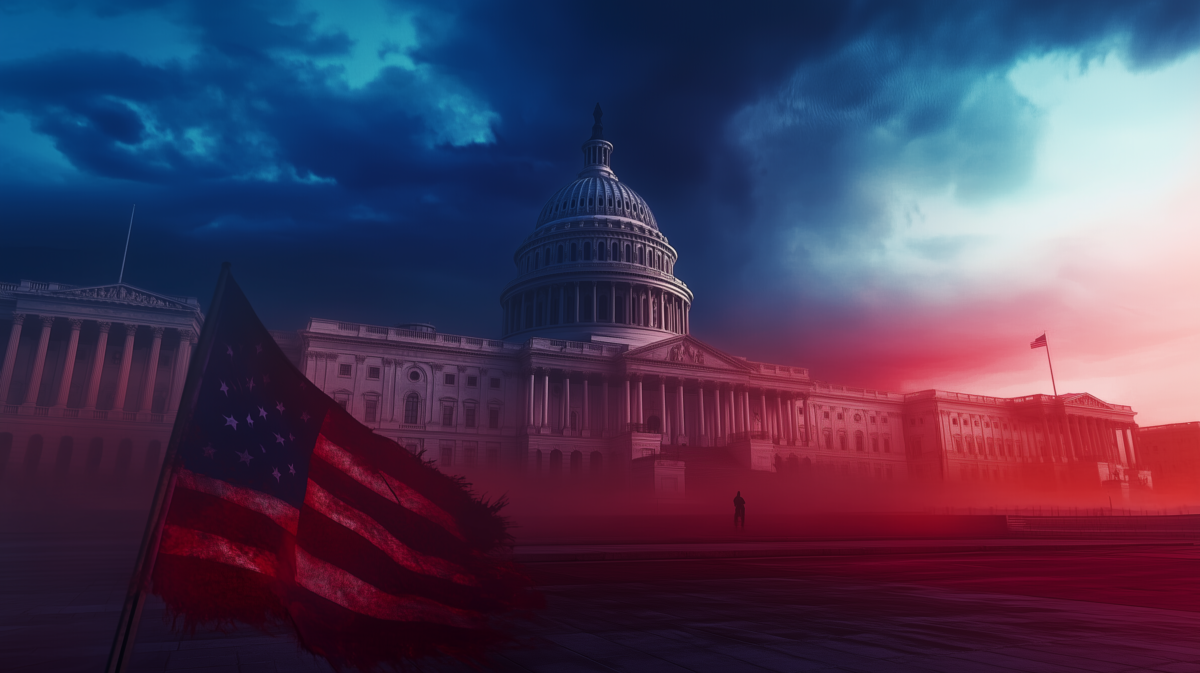
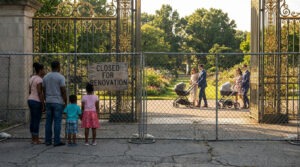
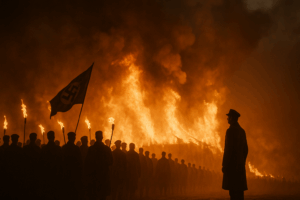
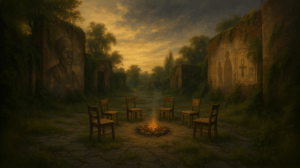

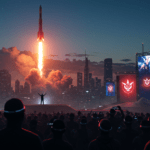

Add your first comment to this post